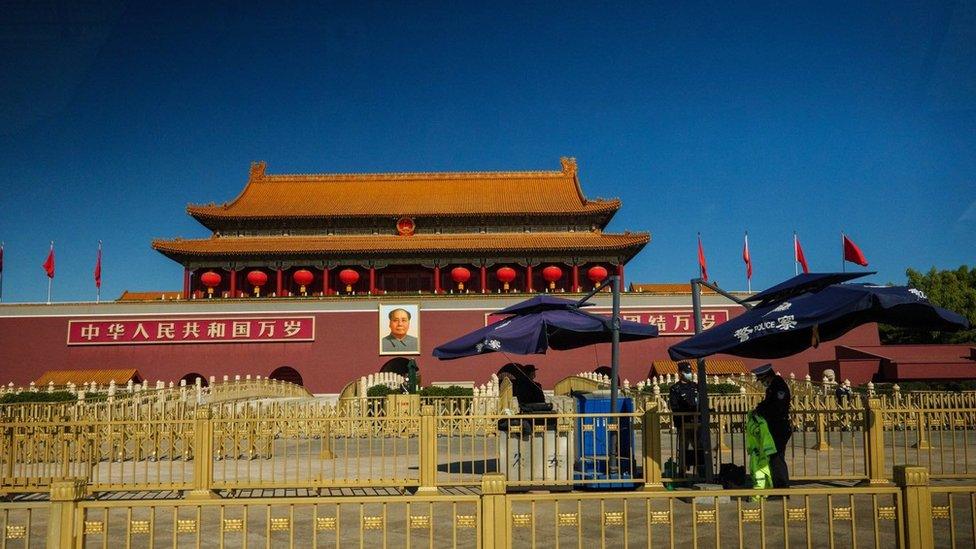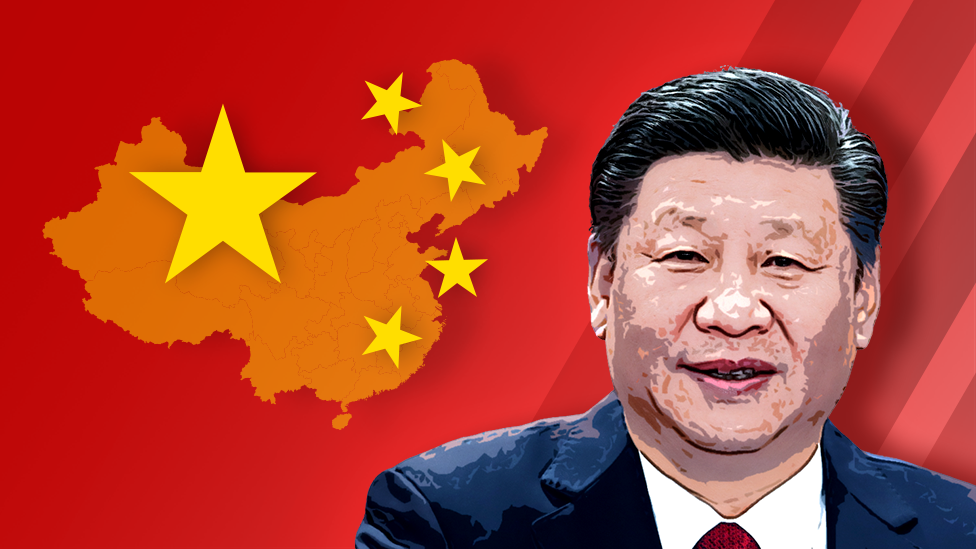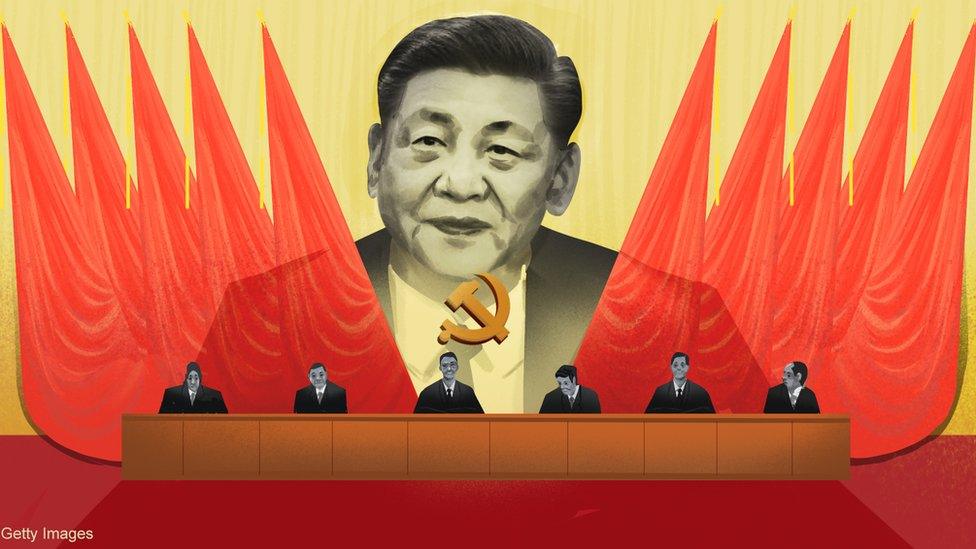China congress: Xi cements power by packing top team with loyalists
- Published
Watch the moment Xi Jinping leads out his new Politburo Standing Committee
China's leader Xi Jinping has moved into a historic third term in power, as he revealed a new leadership team stacked with loyalists.
On Sunday the Chinese Communist Party (CCP) unveiled its Politburo Standing Committee, with Mr Xi re-elected as general secretary.
Observers say the line-up, handpicked by Mr Xi, shows he prizes loyalty over expertise and experience.
The unveiling came after a week-long party congress in the capital.
More than 2,300 delegates elected various leadership groups and gave Mr Xi a new mandate over the party, in a break from decades-long tradition.
No other party leader besides CCP founder Mao Zedong has ever served a third term.
Leaders of China's allies - Russia's Vladimir Putin and North Korea's Kim Jong-un - were among the first to send their congratulations.
On Sunday, a day after the congress closed, Mr Xi strode onto a stage in Beijing's Great Hall of the People trailed by the six other men of the Politburo Standing Committee.
The group sits at the very top of the CCP and is the Chinese equivalent of the presidential cabinet.
After introducing the team, he gave a short speech thanking the party for their trust in them, vowing to achieve the "great rejuvenation of the Chinese nation on all fronts".
Apart from two men - anti-corruption chief Zhao Leji and political theorist Wang Huning - the rest are new to the team.
Premier Li Keqiang, the country's number two leader, was not seen - he is among four men who have retired from the committee.
Significant reshuffles of the standing committee after a term are common. But observers have noted that by getting rid of Li Keqiang and others, Mr Xi has ensured he is now surrounded by a group where nobody with a different perspective to him has been included.
"He felt no need to assign a spot to an alternative faction, which shows his priority is projecting dominance over magnanimity, when he is facing international pushback," said Wen-ti Sung, a lecturer at the Australian National University.
Observers say the line-up shows that loyalty to Mr Xi trumps ability and experience, flying in the face of the Communist Party's credo that it is a meritocracy.
The official titles of the standing committee members will only be confirmed at next year's parliamentary National People's Congress meeting, where Mr Xi will be confirmed as president again.
But many believe that Li Qiang - who walked out right behind Mr Xi during the highly-choreographed ceremony - will become Premier and therefore the one to manage China's economy.
Li Qiang is currently the party secretary of Shanghai and oversaw the city's controversial lockdown where tens of millions experienced significant food shortages.
Some believe that by making him premier, this sends a signal that Mr Xi does not prioritise economic activity.

Security for the congress was tight
"This promotion alone is significant for us to reconsider the power structure of China under Xi's third term," said Professor Yang Zhang of the American University, pointing out that Li Qiang is the first official to be promoted without any working experience in central government.
Another standing committee appointment that has raised eyebrows is Cai Qi, the mayor of Beijing.
He was seen to have performed well when the capital successfully hosted the Winter Olympics earlier this year during the pandemic. But he also attracted controversy when he launched a plan in 2017 to reduce Beijing's population that ultimately forced out many low-income earners from the city.
"Cai was not even among the Communist Party's top 370 leaders before the last party congress. Now he is the fifth most powerful person in China," said Neil Thomas, senior China analyst of the Eurasia Group.
Others have also noted that once again no woman has made it to the standing committee - likely to be a disappointment to China's feminists but not a surprise.
Indeed the lone female member of the 25-member Politburo, Sun Chunlan, has retired so that grouping is also without any female participation.
"This is a very sad and shocking arrangement," Prof Yang said.
On the streets of Beijing, residents were not surprised by the line-up. "All of them belong to the same faction. It's expected," one person told the BBC.
"It's okay that Xi continues with his third term as long as people can get food. We can feed ourselves but it's still difficult. Many businesses are going through particularly difficult times," said another resident.
Many ordinary Chinese have been watching the party congress closely to see whether authorities will relax Covid measures afterwards.
Patience in Mr Xi's stringent zero-Covid policy is thinning, and days before the congress opened a man staged a rare public protest in Beijing, calling for an end to the policy and Mr Xi's removal.
But Mr Xi has made it clear there will be no immediate loosening of measures.
On China's heavily censored social media platforms, the reaction has been muted. Tens of millions of Chinese watched Sunday's proceedings on state media livestreams - but all comment sections were disabled.
On Weibo, only official media outlets were allowed to post news about the line-up. The comments were scrubbed, leaving only a few posts singing praises for the new leadership.
However, Chinese users of other platforms such as Twitter - which is banned in China but can be accessed by virtual private networks - were much more critical.
"Xi's Army lives up to its name, and the whole country welcomes the return of the empire," said one Twitter user sarcastically.
Additional reporting by Grace Tsoi and BBC Chinese
Related topics
- Published17 October 2022

- Published17 October 2022
